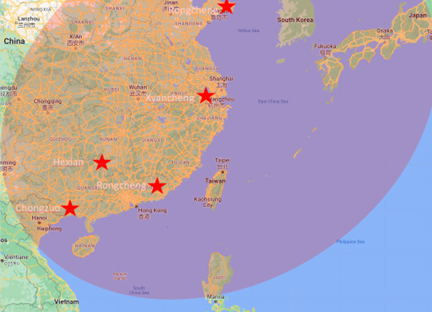Image: RNT Foundation
What’s New: The results of a war game outlining how China will cut undersea cables, attack GPS, and otherwise isolate Taiwan in a conflict to take control of the island.
Why It’s Important:
- Like most advanced nations, Taiwan has not widely adopted alternatives to GPS and other satnav. Denying GPS could help bring the nation to its knees.
- China’s terrestrial complement to satnav, eLoran, is very difficult to disrupt and reaches far beyond Taiwan (see image). Even if the US were to disable BeiDou, as envisioned in the war game, China would still have PNT at home and in the theater of conflict. This is not mentioned in this report on the war game.
What Else to Know:
- China has a very extensive PNT architecture with satellites at GEO, MEO, and LEO, terrestrial broadcast with eLoran, and a 20,000km fiber network with 294 timing stations to integrate and synchronize all the timing sources.
- Chinese vessels have already cut some undersea cables serving Taiwan, as envisioned in the wargame. The cuts could have been accidental, or not.
- China also has its own undersea cable manufacturing and laying capability and has aggressively entered the world market.
![]()
War game reveals Chinese attacks on communications could paralyze Taiwan
Earlier this year, the chairman of the House Select Committee on the Chinese Communist Party asked Elon Musk if he was withholding StarShield satellite services from United States service members on and around Taiwan. Musk replied that he was in full compliance with his Pentagon contract. Shortly thereafter, Musk refused a Taiwanese bid to secure Starlink services and Taiwan announced it would be developing a “Starlink” constellation system of its own. As a stopgap, Taiwan contracted with OneWeb for satellite internet and communication services.
Two years ago, to find out, the Nonproliferation Policy Education Center proposed conducting a space war game that focused on a near-term Taiwan-China scenario. This June, it tapped the talents of current and retired officials, Congressional Staff and outside experts to play the game. They were divided into multiple teams, representing Taiwan, Eutelsat OneWeb, the Allied Space Nations (the U.S., U.K., Japan, France, Russia and India), and China which was played by the Control team.


